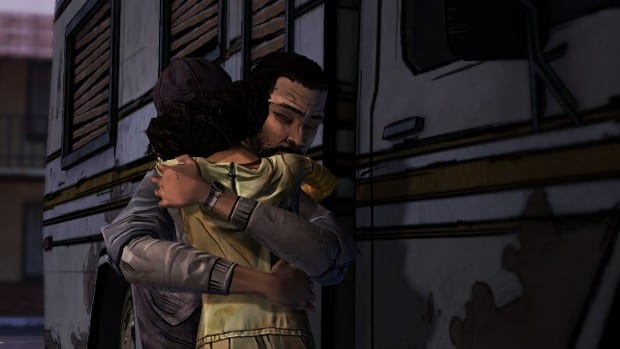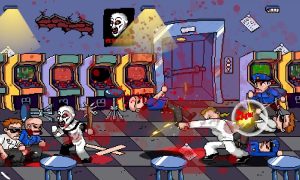 Let’s be honest: storytelling in most games is absolute garbage. Sure, you’ve got The Walking Dead winning Game of the Year awards left and right, mostly for its gripping story line and top-notch character development rather than for its actual playability. Indie games like Journey and Hotline Miami have rocketed into the limelight as well, tackling heavy issues in very unique ways by letting the game do most of the work rather than telling a conventional, dialog-driven story.
Let’s be honest: storytelling in most games is absolute garbage. Sure, you’ve got The Walking Dead winning Game of the Year awards left and right, mostly for its gripping story line and top-notch character development rather than for its actual playability. Indie games like Journey and Hotline Miami have rocketed into the limelight as well, tackling heavy issues in very unique ways by letting the game do most of the work rather than telling a conventional, dialog-driven story.
But for every game that seems to get it right, there are a dozen others which are filled with predictable tropes and teenage bombast. Every deep, well-written character is surrounded by hundreds with bigger breasts, and every heart-wrenching moment is enveloped by a million bigger explosions. That’s not to say games like Boob Lady: The Explosion Master don’t have their place (if sales numbers are any indication), but I’d like to offer a few pieces of advice to a medium struggling to fulfill its potential
Just a quick warning, as this is a discussion about stories of various video games, there will be spoilers sprinkled throughout. I try to keep them to a minimum, but if you don’t want to know anything about any game ever (specifically Earthbound, God of War III, and Far Cry 3), proceed at your own risk.
A sub-par conclusion can sour even the greatest journey
It’s hard to come up with more than a handful of video games with a compelling conclusion — while there are thousands upon thousands of films with even half-way decent endings, the actual amount of video game stories with a good, memorable, worthy end are a mere fraction of that. Even games like Bioshock, considered a hallmark of video game storytelling, has a pretty crappy ending; even lead designer Ken Levine acknowledges this, and seeks to rectify it in the upcoming spiritual-sequel, Bioshock Infinite.
[singlepic id=10245 w=320 h=240 float=left]Sometimes you’ll get a worthwhile ending; one that acts as a cap to the rest of the game preceding it — a nice finish to a quality game. Others are so hellbent on tying every single loose end together that they spend over an hour explaining everything. Most of the time, though, endings are an afterthought — something thrown together at the last minute of game development to tie everything together in the most slapdash manner possible. Any one who has beaten Final Fantasy VII will understand my pain — the act of living with these characters for fifty or more hours, only to see it all thrown away in a two minute cutscene that makes zero sense, even with context. Hell, it took fans to fix the completely broken ending for Star Wars: Knights of the Old Republic II. The sad thing is, this is the rule, rather than the exception.
Where are the endings like Shadow of the Colossus, where all of the player’s actions culminate in a final thematically satisfying conclusion that brings the entire plot full circle? Where are the endings like Earthbound, where you can wander the entire game world without fear of attack, listening to literally every person you’ve met along the way congratulate you? Even Gears of War 3, as dude-bro-chainsaw as it was, had a decently satisfying conclusion to its trilogy by actually ending the thing. The same can’t be said for God of War 3’s story-cheapening, so-worn-out-it’s-insulting “maybe he’s not really dead” trope they pull after the credits finish rolling.
Speaking of trilogies, maybe telling a story over a set of three games is the answer…
A game should stand on its own before even being considered a trilogy
This whole “we’ve planned a trilogy” thing needs to go. It seems every single franchise these days is pre-destined to become a trilogy before it sells its first Day One DLC code. Game designers have grandiose visions of sweeping epics – one game cannot possibly contain the entire story, so right at the outset, three (or in Shenmue’s case, sixteen) games are planned. The problem with this lies in the completely nebulous nature of game development.
[singlepic id=10247 w=320 h=240 float=right]Over the course of a series’ development, many things can change: publishers may switch between games, developers and writers can leave, and new writers can be brought on, possibly changing the entire tone of the game in the process. Because of this, most game stories that are built as trilogies tend to follow the Star Wars model: the first game sets up the world and the characters, the second tries to break our characters during the “dark middle chapter,” while the third ruins most of everything we’ve enjoyed about the series thus far. Mass Effect 3 is a direct product of these changes – the loss of several key writers, as well as the monetization and deadline pressures EA brought to the mix, completely hamstrung the ending. What should have been a meaningful conclusion to one of the most genre-defining games of this generation instead became a mishmash of deus ex machina and plot holes a Thresher Maw could fit into.
Sometimes success can be a problem, seeing games originally planned as trilogies balloon out of control: a series like Assassin’s Creed has only three numbered titles, but five total games in the “trilogy” (not counting the portable titles). Still others don’t even get to finish their stories if the first game doesn’t sell as planned. Games like Advent Rising and Too Human were planned as trilogies, but since the first entries sold fewer copies than other commercial failures like Brutal Legend and Okami, future entries in these series’ plans were cut quicker than Denis Dyack’s account from NeoGAF, leaving the shards of a story that cannot stand on its own. Which may be for the best, as I doubt anyone really cared what happened to Cyber-Baldur and Mecha-Loki.
If no one gets the message, maybe the players aren’t the ones at fault
Far Cry 3 has been lauded for its addictive and sprawling gameplay. The same cannot be said for its story, which is juvenile, crass, and borderline racist. While never overtly offensive (well, any more offensive than your typical violence-filled first person shooter), it deals with some storytelling tropes that, with a better, more subtle writing staff, might have been able to make it work.
[singlepic id=10246 w=320 h=240 float=left]The problem with Far Cry 3 lies in its reliance on the “magical negro” stereotype. When Jason lands on the island, he is immediately taken in by the natives. See, they’ve been trying to take the land back by the awful drug runners, but they can’t do it. Only Jason, a pasty-faced white kid from California can become “the one” and do what these supposedly inept native warriors cannot. Jason’s transformation from wimpy club kid to John Rambo is virtually instantaneous, and the supporting characters always help with the proper advice or magical powers, but never seem to have the abilities to do anything themselves. It never goes so far as to actually say any of this, but the general tone and flippant attitude with which Far Cry 3 treats the story is problematic.
What makes this even worse is that, apparently, “I don’t get it.” From Penny Arcade Report’s interview with lead writer Jeffrey Yohalem:
I asked Yohalem if, since it seems like his message isn’t catching on, he would alter his approach in upcoming writing. “No,” he told me. “What I’m hoping is that through talking about this game and the Internet talking about this game, is that all this stuff will come to light, and the audience will say next time, ‘We want more of this.’”
“This all comes from my sense that players shouldn’t be talked down to. For me, there’s a kind of caustic relationship that’s developed between players and developers. It’s really a bad, abusive relationship, because developers say ‘Players won’t get it anyway, so we’re just gonna do something that holds their hand.’ It doesn’t respect them, and then players say ‘I hate this,’ or ‘I hate that,’ or ‘This game sucks,’ and that hurts developers. So it’s like a cycle. It also feels like critics aren’t looking for meaning in the game, either. So it’s like all sides have just stopped listening to each other.”
His heart seems to be in the right place, but I have a problem with what he’s trying to say here. We as players absolutely need to ask these questions and crave deeper meanings in the entertainment we consume, but he’s stated that he’s not going to explain the “deeper meaning” behind what’s actually going on, so all we’re left with are our experiences with the game.
What I experienced was a game that may have tried to subvert established tropes, but instead reveled in them, creating a muddy experience that may have distorted whatever message he was trying to get across. And when every single person who has played this game is saying pretty much the same exact thing, maybe the problem isn’t with us.
Lazy stereotypes need to go
What Far Cry 3 has done, however, is expose most of video game writing and storytelling as a complete sham. How many games have you played where the main character is a muscle-bound white guy with a female sidekick sporting giant breasts? 95% of video games are basic male-empowerment and wish-fulfillment fantasies. Even a game like Heavy Rain, which has been renowned for at least trying to come up with a engrossing and mature story, has a fairly exploitative attempted rape scene that serves literally no purpose within the context of the game, other than to hypersexualize dramatic tension.
[singlepic id=10248 w=320 h=240 float=right]The other five percent is where we get games like The Walking Dead and Spec Ops: The Line. Spec Ops starts off as a generic military shooter, but then begins to question those same tropes that Far Cry 3 supposedly questions. The main difference is that Spec Ops largely succeeds with its subtle, yet visible clues and its constant questioning of the main character’s – and to a larger extent, the player’s – motives. It doesn’t find entertainment within its horrific and harrowing scenes, but rather uses them to push the limits of what the player expects out of a game.
And sure, The Walking Dead is a “zombie” game, but zombies are merely window-dressing to showcase exactly what will happen to people when pushed into an end-of-the-world scenario. Its use of racism is subtle – rather than blatantly offensive – and is used sparingly, to show the interactions between the African-American hero Lee and his mostly Caucasian cohorts. Racial tensions are among many other struggles that prevent our band of travelers from fully seeing eye to eye, and The Walking Dead never uses it as a cheap storytelling “out” or for shock value. These interactions truly mean something, and whenever they play the “race card,” it always carries weight – something that Far Cry 3 never truly grasps. It’s probably the reason why The Walking Dead is considered one of the current pinnacles of video game storytelling, while Far Cry 3’s story is largely considered a joke.
As long as game designers keep dude-ifying their stories and sticking to these worn-out stereotypes, the art of interactive storytelling will slowly fester and die off, becoming nothing but samey, focus-group-tested parodies of what games once were.
Though, what do I know? Considering the sales numbers of loud, stereotype-laden explosion-fests, maybe that Boob Lady game isn’t too far off. I, for one, think we deserve better.
I've been gaming since my dad made the bad decision of buying me a Nintendo when I was four years old. Every day I'd find myself with my face glued to a TV screen, punching away at buttons, getting furious with Bowser, Dr. Wily, and those freakin' birds in Ninja Gaiden. Since then I have failed to get my parents to play any board game with me, I sold my full copy of Earthbound with box and guide for $300 to some dude in Austria for rent money, and I still believe in Nintendo even after all these years.

See below for our list of partners and affiliates:

























